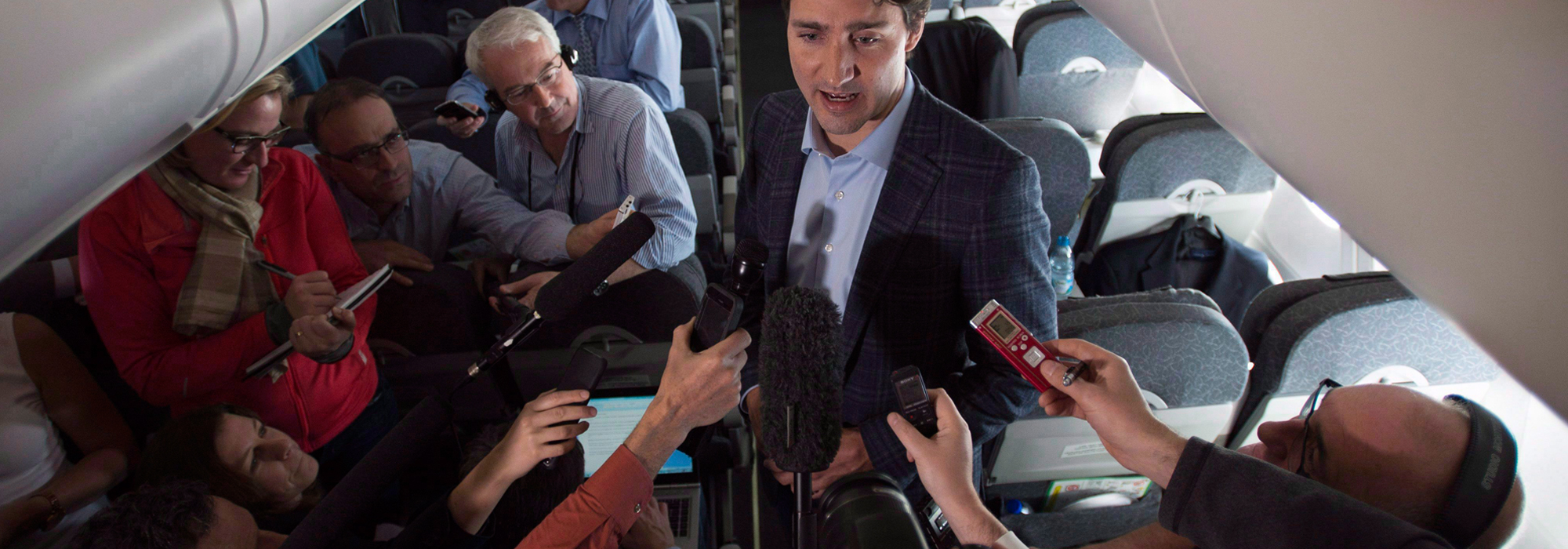
By now, the contentious relationship between news media and America’s 45th president is well-established. At his first news conference since November’s election, Donald Trump berated a CNN reporter and unfairly accused the network of airing “fake news.” On his first full day as president, Trump called journalists “among the most dishonest human beings on Earth,” and falsely said they fabricated his feud with CIA officials. White House press secretary Sean Spicer also scolded reporters in the West Wing, echoing Trump’s lie that media outlets downplayed the size of his inauguration crowd.
That’s on top of Trump’s previous attempts to blacklist, sue, insult and blame news organizations for “inciting violence.” Not to mention his peddling of those pesky “alternative facts.”
We’re only weeks into his presidency, and freedom of the press in the United States is already facing an unprecedented threat. Never in modern American history has a president so vigorously attacked First Amendment rights. And never has there been a greater opportunity for Canada to showcase its journalistic gravitas in comparison.
The world order is shifting, and Canadian outlets should take advantage of this pivotal moment. For decades, America defined the global news agenda as arguably the major media power. That’s changing.
Not only is the Trump administration compromising American journalism, public trust in mass media has also fallen to a “new low,” according to a September Gallup poll. The recent rise of hyper-partisan fringe sites and the spread of fake news likely contributed to that dim view. By and large, these obstacles paint a bleak picture for the future of media in the U.S.
Canada can and should fill this vacuum.
Deserved or not, Canada is increasingly seen as a beacon of liberalism and morality amid the surge of right-wing populism in the U.S. and Europe. Save for one decade under Stephen Harper, Canada has typically enjoyed a stellar—albeit muted—global reputation, flying under the radar as a respected middle power. But in recent times, our international profile has been elevated, thanks largely to Prime Minister Justin “Anti-Trump” Trudeau, who assumed office just over a year ago.
Photogenic, blessed with good hair, physically fit and a self-proclaimed feminist to boot, Trudeau mastered the PR game and won over international media, even as homegrown critics remain skeptical. Throw into the mix Canada’s current pop cultural dominance – Drake, The Weeknd, Justin Bieber, Ryan Gosling, the list goes on – and it’s clear our soft power is growing. The world is paying attention to us, so we’d better make the most of it.
How? By establishing Canada as a leader in ethical, innovative journalism and as a protector of press freedom.
We’ve already got the ethics and standards part down; recall back in 2014 when Canadian outlets received wide praise from foreign media for their measured coverage of the Parliament Hill shooting. What’s more, after a protracted “dark age” for media under Harper, embattled journalists covering Parliament Hill emerged even more skilled at their jobs.
The issue of press freedom, however, is ongoing. Despite publicly supporting independent media, Trudeau is combatting criticism that many of the Harper-era infringements on the media are continuing under his watch. So, although Trudeau’s relationship with journalists is far better than that of his predecessor, he still has a lot more to do before Canada can recover from its poor showing in last year’s World Press Freedom Index.
That leaves innovation—the most important hurdle for Canadian media to clear. To truly become a global leader in journalism, we should actually follow America’s lead when it comes to risks. Meaning: Take more.
First, like the U.S., we must bet on diversity. One in five Canadians are visible minorities, while half identify as such in Toronto, our country’s largest media market. It’s good business sense (not to mention good news sense) to invest in coverage that reflects a rapidly growing demographic. That means hiring more people of colour in newsrooms, especially for leadership positions, to ensure a diversity of story ideas.
To meet growing demand, there should also be greater supply. The sheer number of media outlets competing in America forces them to innovate to stay ahead. Canadian news organizations, however, are slower to respond to industry changes because they face less competition. In particular, legacy publications tend to hold on to outdated editorial processes (e.g. prioritizing print over online, failing to invest in new technologies) because there’s no incentive to evolve.
That’s where the federal government comes in. Trudeau said Ottawa will invest $800 million over the next four years into strengthening “innovation networks and clusters”— that is, areas where tech startups, universities and government work together—to drive productivity and, ultimately, economic growth. As Discourse Media CEO Erin Millar recently predicted, let’s hope this “Innovation Agenda” will help launch digital media startups that “will attempt to bring a unique viewpoint and funding model, transforming Canada’s media market into an entrepreneurial laboratory for the future of media.”
Right now, though, Canadian outlets are struggling. Last summer, after a spate of newspaper closures and layoffs across the country, Ottawa hired think-tank Public Policy Forum to assess our journalism industry and suggest ways to keep it afloat. That report, released recently, made a number of substantive recommendations, including taxes on Google and Facebook.
But we need to think beyond surviving, and start thriving.
Always the underdog, it might be hard to imagine Canada assuming America’s traditional role as the dominant media power. But it’s less difficult to envision a Canadian, a Scot or a Singaporean all visiting CBC.com, TheGlobeandMail.com or TheStar.com for reliable reporting and innovative storytelling techniques.
Now is the time to make our media as integral to Canada’s global reputation as poutine and peacekeeping.
This article is part of the special feature The Future of Canadian Journalism.
Photo: Prime Minister Justin Trudeau speaks to reporters while flying from Antalya, Turkey to Manila, Philippines on Tuesday, Nov. 17, 2015, to attend the APEC Summit. The Canadian Press/Sean Kilpatrick
Do you have something to say about the article you just read? Be part of the Policy Options discussion, and send in your own submission. Here is a link on how to do it. | Souhaitez-vous réagir à cet article ? Joignez-vous aux débats d’Options politiques et soumettez-nous votre texte en suivant ces directives.








